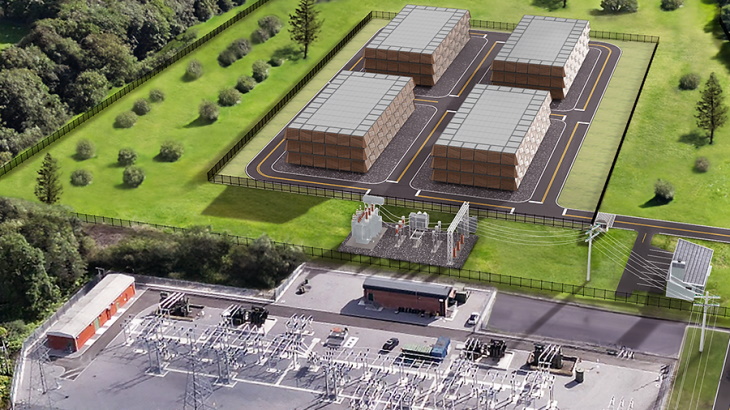US microreactor developer Last Energy has announced plans for four microreactor power plants at the site of the decommissioned Llynfi coal-fired power station in Bridgend County, south Wales.

A rendering of the Llynfi Clean Energy Project (Image: Last Energy)
Last Energy is a spin-off of the Energy Impact Center, a research institute devoted to accelerating the clean energy transition through innovation. Its reactor technology is based on a pressurised water reactor with a capacity of 20 MWe or 80 MWt. Power plant modules would be built off-site and assembled in modules.
A Last Energy plant, referred to as the PWR-20, is comprised of a few dozen modules that, it says, "snap together like a Lego kit". The PWR-20 is designed to be fabricated, transported, and assembled within 24 months, and is sized to serve private industrial customers. Under its development model, Last Energy owns and operates its plug-and-play power plant on the customer's site, bypassing the decade-long development timelines of electric transmission grid upgrade requirements.
The company said it is advancing plans to develop four PWR-20 plants on the vacant site of the Llynfi coal-fired power station. It said the new plants will "provide energy security to local manufacturers, create jobs, and unleash a long-term economic investment in the region".
The Llynfi power station - a 120 MW coal plant - operated between 1951 and 1977. Following decommissioning in 1977, the 14-acre site has remained vacant.
"We chose Llynfi because of its proximity to a large existing industrial base, which is in need of secure 24/7 clean power," Last Energy said. "Llynfi Clean Energy Project will support growth, revitalisation, and decarbonisation of local industry."
Last Energy said it has been actively engaging with the UK's Office for Nuclear Regulation, Natural Resources Wales, Planning and Environment Decisions Wales, the Environmental Agency, and with local and national Welsh and UK officials, and will continue to do so throughout the project.
The company is targeting 2027 to commission the first plant, "following a successful planning and licensing process".
Last Energy estimates the project represents a capital investment of GBP300 million (USD393 million), which will not require public funding. Contracts with local suppliers would amount to over GBP30 million, while more than 100 full-time local jobs would also be created.
"Last Energy's Llynfi project will not only transform a vacant coal site into a hub for clean energy production, it will also create economic opportunity for companies throughout south Wales," Last Energy UK CEO Michael Jenner was quoted as saying by Nation-Cymru. "The benefits of nuclear power speak for themselves, so our focus must be on delivering those benefits on time and on budget.
"Last Energy's emphasis on mass-manufacturability allows us to deliver significantly smaller plants in under 24 months with purely private financing. We look forward to engaging with the public, meeting local suppliers, and being an active partner in south Wales' path towards energy security and industrial decarbonisation."
In August, the company announced that it had reached commercial agreements for 80 units. Last Energy announced agreements for 34 units in 2023 and began 2024 with agreements for 50 units. Of the agreements, 39 of the 80 units are slated to be built to serve data centre developers.
The company says its goal is to build 10,000 units in the next 15 years.